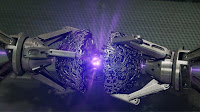I wanted to revisit a topic I discussed a while back. If you’ve been following the ranty blog for a while, this’ll probably seem familiar. And if not, well, I promise it’ll be as semi-informative as anything else I put up here…
A few years ago, on one of the message boards I used to frequent, someone once accused me of being horribly biased against anything that’s “character driven” or lacks a plot. I didn’t feel the need to address it there, but it did get me thinking. Am I horribly biased?
After wondering about it for a brief while, I realized… yes. Yes I am.
Horribly biased.
 Keep in mind what bias means. We tend to think of it as something evil (especially during an election season) but all it means is someone has an automatic tendency to lean toward or away from something when it comes to judgment. If I have the choice of watching a sitcom rerun or Agents of SHIELD, my personal bias is to watch Agents of SHIELD. If one salad is made with spinach and one with kale, I’ll probably choose the spinach. It doesn’t mean Agents of SHIELD beats every sitcom or that spinach is always better than kale—it’s just the way I roll.
Keep in mind what bias means. We tend to think of it as something evil (especially during an election season) but all it means is someone has an automatic tendency to lean toward or away from something when it comes to judgment. If I have the choice of watching a sitcom rerun or Agents of SHIELD, my personal bias is to watch Agents of SHIELD. If one salad is made with spinach and one with kale, I’ll probably choose the spinach. It doesn’t mean Agents of SHIELD beats every sitcom or that spinach is always better than kale—it’s just the way I roll. Unless the spinach is cooked, which is disgusting.
By the same token, if I have the choice between a story where extensively-defined protagonists do absolutely nothing and a fun story with good characters and an arc… well, I’ll go with option B every time.
So, yeah, I’m biased. In fact, if you check the numbers, you’ll find most people are. We like compelling characters, but we also want to see things happen. Check out a list of bestselling books or films or plays. How many of them involve people sitting on their butts for long periods of time? How often do we look at a list of Academy award nominees and realize we haven’t seen 3/5 of them… if not more?
The sad truth is, that kind of stuff just doesn’t sell.
Please keep in mind before you leap to the comment section–I’m not the only one saying this. People have been saying it for decades. Probably centuries. There’s a reason so much of Charles Dickens’ popular crap survived and most people can’t even name three of his contemporaries. Stephen King has had a storytelling career for five decades now, but how many other authors followed him out of the 1970s? People want to be entertained. Silent film director Marshall Neilan humorously pointed out (about a hundred years ago) that there are two kinds of directors—the ones who make artistic movies and the ones whose movies make money.
Are making money and popularity the only yardsticks of success? Hell no, not by a long shot. But they’re the common ones that most folks use. If I tell you that I wrote a phenomenally successful book, you’re not thinking I made my dad proud, or impressed my tenth grade English teacher, or really touched three dedicated readers. When I say “phenomenally successful” it means the book hit the New York Times bestseller list, sold a few million copies, and I’m writing this out for you next to my kidney-shaped pool while Jennifer Lawrence works a knot out of my shoulders.
All that being said, there’s nothing inherently wrong with stories that focus more on character than on action. There are a lot of character-driven stories that are just fantastic. They’re vastly outnumbered by thebad ones, no question, but saying all such stories are bad would be just as lazy as the folks who dismiss all genre work as pedestrian and simplistic. Harper Lee’s To Kill a Mockingbird is far more a slice-of-life story than it is a courtroom drama. Fiend is about drug addicts stumbling through a zombie apocalypse. Contact is people studying and deciphering radio signals from the stars while figuring out what this discovery means for humanity. The film (500) Days of Summer is far closer to a character study than a romantic comedy. I’m sure anyone reading this can name three or four more.
So, if I want to write something that leans far more on character then action, here are three tips for making it something people will still want to read.
1) Have compelling characters
Somewhere along the line a lot of people got it in their heads that the only way a character can be interesting is if they’re seriously messed up. This became the yardstick for “mature” fiction. My character’s a drug-addicted, abuse-surviving, cancer-ridden, sexually-frustrated, self-loathing, dishonored soldier with a horrible case of Tourettes Syndrome currently working as a waiter at Denny’s.
While such a person may have a great deal going on under the surface, you’ve got to wonder how my reader’s supposed to relate to such a character. Or how they’re supposed to like them. Even if this is some kind of redemption tale… how do I have somebody come back from going that far off track?
If I’m going to make my story all about characters, I need to make it about characters my readers will actually like. They don’t need to be perfect, by any means, but they also don’t have to be so flawed we wonder why they’re not in prison or an institution. Someone facing an uphill battle is great, but someone facing a sheer cliff is just pointless.
2)Have something happen
This is probably my biggest complaint with 99% of such stories that I read. Nothing happens. The week this story covers is the same week a few million other people have had. Heck, it’s indistinguishable from the same week these characters have had fifty-two times a year. Mundane. Average. Unspectacular. There’s nothing special or noteworthy about it in any way.
Now, nobody has to fight off a killer AI android for a story to be interesting. They don’t need to rob a bank or save the Ark of the Covenant from the Nazis or steal the Declaration of Independence. But they need to do something. If my characters don’t have a reason to aim a little higher while we’re watching them, then we’re seeing static characters.
3) Have an arc
Once I’ve got a compelling character and I’ve got something happening, I need to have an arc. By its very nature, an arc implies we end somewhere else. Arcs that end in the same place are called circles, and there’s a reason you haven’t heard of well-structured character circles. You’ve heard of people running in circles, though, haven’t you? And that’s never a good thing, is it?
The whole point of a story is to get from A to B. People grow and change. If there’s only going to be A, that’s just a plot point. Plot points can be fascinating, but they also tend to sit on the page if they’re all alone with nothing backing them up. Just as something needs to happen in the observed life of my character, something needs to change.
And that’s it. Seriously. It’s really that simple. Three tips to writing a character-driven story that will still make audiences cheer.
Because cheering audiences pay better.
Next time…
Well, I’ve got an idea for next time, but I guess we’ll see if I get to it or not.
Until then, go write.














